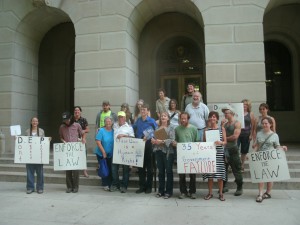Blogroll
AppalachiaŌĆÖs coal-bearing counties would directly benefit from the adoption of the POWER+ plan, a proposal in the Obama administrationŌĆÖs 2016 budget that would direct more than a billion dollars to Central Appalachia.
But last week, the U.S. Senate appropriations committee passed a budget bill the leaves out any mention of POWER+.
The U.S. House budget leaves Virginia entirely out of the forward-thinking Abandoned Mine Lands funding reforms that were spelled out in the POWER+ Plan. That component of the plan would send $30 million directly to the Virginia coalfields for economic development and put laid-off miners back to work cleaning up the messes left by coal companies.
Please contact your senators now to make sure they support a budget that includes a path forward for Appalachian communities.
For more background, we recommend this piece by Naveena Sadasivam for InsideClimate News, which details the curious quiet around POWER+ and how the plan has been pulled into the partisan bickering thatŌĆÖs embroiled the U.S. Environmental Protection Agency’s Clean Power Plan and the 2016 budget process as a whole.
Under the federal Abandoned Mine Lands program, sites that pose a threat to safety are prioritized over sites that offer a potential economic benefit if cleaned up. While this program has reduced potential hazards in the coal-mining regions of Appalachia and the U.S., it has done little to positively impact local economies.
The POWER+ Plan, however, calls for funds to be used for projects that not only improve the environment and reduce hazards, but also create an economic benefit for local economies.
ThereŌĆÖs still time for both House and Senate to include the meaningful funding proposals outlined in POWER+. But in order for that to happen, we need to the Senate to hear a clear message that Appalachia deserves this much-needed funding!
Please contact your senators now to make sure they support a budget that includes a path forward for Appalachian communities.
No comments yet » Leave your own...

CLICK on the image to sign the petition!
Jim Justice – target of the regional Justice to Justice campaign, recently expressed interest in becoming governor, much to the dismay of the thousands who have been cheated out of wages by Justice bad business practice, or had their communities damaged by outlaw mines he owns.
As Tom Torres, an activist with the Justice to Justice campaign and the group Hands Off Appalachia, says┬Āin this Grist article, ŌĆ£He has this public persona as a down-home charitable member of the community, and at the same time he owes millions of dollars to unpaid contractors and all these state and federal agencies for labor violations and environmental violations and safety violations.ŌĆØ
Sign this┬Āpetition against Jim Justice‘s bad actions here to join the campaigning for him to clean up his mess and pay off his debts.
No comments yet » Leave your own...
Healthy critters in our streams are an important sign that┬Āthe water is safe for all life. So it’s key that we keep an eye on the crawdads!

Big Sandy crayfish photo by Guenter Schuster.
Our friends at┬ĀCenter for Biological Diversity have created a petition and lawsuit┬Āthat forced the U.S. Fish and Wildlife Service to┬Āpropose┬Āto protect two species of crayfish from Appalachia under the Endangered Species Act. The crayfishes have been lost from more than half of their ranges because of water pollution, primarily from coal mining. The Big Sandy crayfish is known only from the Big Sandy River basin in eastern Kentucky, southwestern Virginia and southern West Virginia; the Guyandotte River crayfish is known only from the Guyandotte River basin in southern West Virginia.
This listing proposal means that federal agencies will now have to confer with the U.S. Fish and Wildlife Service before funding or permitting any activity that could harm the animals. When the listing is finalized in 12 months, it will be illegal for any person or corporation, including coal companies, to harm the crayfishes or their habitat. The Service will propose critical habitat to protect the crayfishes in the near future.
No comments yet » Leave your own...

The U.S. Senate has been in session for less than three weeks, and they have already begun an attack on the Appalachian mountains and surrounding communities.
Coal industry boosters have introduced a pro-mountaintop removal coal mining amendment and they are trying to attach it to the Keystone Pipeline bill, which is expected to be voted on this week.
The amendment, introduced by Sen. Dan Coats of Indiana, would block the Department of Interior from completing its ongoing rewrite of the Stream Protection Rule. The coal industry is afraid that a strong rule would make it harder for them to continue blowing up mountains and dumping the waste in streams.
Join us in fighting against this mountaintop removal amendment by writing to your senator.
We need the Department of Interior to introduce a strong Stream Protection Rule that would help us put an end to mountaintop removal once and for all. They have been writing the rule for several years, and are expected to release it this Spring.
Please contact your senator and ask them to oppose the Coats mountaintop removal amendment.
No comments yet » Leave your own...

In a rare television interview, environmental legend and writer Wendell Berry spoke with Bill Moyers about activism and his love of Appalachia.
The federal government is shut down and Congress is failing to act on important issues as they battle over the budget. But across Appalachia, citizens have not quit. We are continuing the work to end mountaintop removal.
In the last three weeks alone, groups in the region have held more than half a dozen gatherings to test water, petition state agencies for stronger enforcement and celebrate the communities we have come together to protect.
As groups continue to grow locally, the fight to end mountaintop removal is in the national spotlight. This weekend, impacted citizens will provide leadership at Powershift 2013 in Pittsburgh, Pa.
Also, renowned author and mountaintop removal activist, Wendell Berry, recently spoke with Bill Moyers about his activism and a no-compromise plan to protect our families and future. You can watch it here!
Thank you for fighting to end mountaintop removal.
No comments yet » Leave your own...

A group of West Virginia citizens gather in front of the Charleston, W.Va., location of the federal Office of Surface Mining, where they delivered a 100-page petition detailing a litany of problems with the state regulatory program before marching to the state Capitol to deliver a copy of the petition to Governor Earl Ray Tomblin.
Charleston, W. Va. ¢ Today a coalition of 18 state and national organizations filed a formal administrative law petition with the Federal Office of Surface Mining Reclamation and Enforcement (OSMRE) alleging widespread problems with the state Department of Environmental Protection’s (DEP) enforcement of the Surface Mine Control and Reclamation Act (SMCRA) and demanding federal intervention. The nearly 100 page petition filed today details a litany of problems with the state regulatory program including granting and renewing mining permits illegally, systemic failures to properly assess the risks of flooding from mine sites, drastic understaffing, and failure to assess meaningful penalties for violations of the law. A group of West Virginia citizens gathered a press conference today in front of the Charleston Office of Surface Mining to deliver the petition and then marched to the state Capitol to deliver a copy to Governor Tomblin.
“The situation here couldn’t be more urgent. Every year there is another flood, another stream dies, another health study comes out showing the devastating effects of unenforced mining law on our communities. We need action and we need it now,” said Debbie Jarrell, Coal River Valley resident and Co-Director of Coal River Mountain Watch.
The filing of the petition represents the first step of the Citizen Action for Real Enforcement (CARE) Campaign, a new effort bringing together citizens and groups across the state to demand accountability from the state’s government and address what they say are decades of failures by state agencies. Currently, the state DEP has the authority and responsibility to enforce federal laws on mining. The petition was filed under a provision of SMCRA that allows citizens to ask the federal OSMRE totake over a state agency if they believe the agency is failing to enforce the law. The filing of this petition triggers an obligation on the part of OSMRE to investigate the citizens’ claims and, if they are deemed valid, to order changes in the state program or assume enforcement themselves.
“People who have lived in the coalfields for generations have reached out to our DEP for help. After many years of pleading our case, we have no confidence in our DEP, nor should we. Our only option is to seek federal intervention to assure that our communities get what everyone deserves – protection from the pollution and toxins that are directly impacting the health of the people that live within these communities,” said retired UWMA miner Chuck Nelson.
(more…)
1 Comment » Leave your own...
As I enjoyed Memorial Day with my family and friends, I was reminded that too often we donÆt take time to celebrate the victories that we accomplish together. Our spring has been full of successes, and you helped to make them possible.
In April, a federal appeals court affirmed that the U.S. Environmental Protection Agency has the authority to veto mountaintop removal permits even after they have been issued, a power the coal industry has challenged for years. This decision halted Spruce No. 1 Mine, the largest mountaintop removal mine ever proposed in Appalachia.
The day before the courts dealt that major blow to mountaintop removal, another rulingĀthrew out the U.S. Army Corp of EngineersÆ Nationwide Permit 21, ending the streamlining of permits under the Clean Water Act. A few weeks later, with the support of allies across the county, we defeated attempts in Congress to roll back EPA regulations and gut the Clean Water Act.
You have kept the pressure on by contacting policymakers and supporting actions in Philadelphia, Pittsburgh, Charlotte, Washington, D.C., and Atlanta, including during the 8th annual End Mountaintop Removal Week in Washington, when people from across the country joined in our nation’s capital and attended moreĀthan 80 meetings with federal agencies and congressional offices. Over this time, youÆve sent more than 30,000 emails to key decision-makers in the White House and Congress.
We are building new connections and stronger campaigns, and we are winning together. Thank you for your ongoing dedication in the fight to end mountaintop removal coal mining.
No comments yet » Leave your own...
Yesterday, Rep. Frank Pallone (D-NJ) and Rep. Dave Reichert (R-WA) introduced the Clean Water Protection Act in the 113th Congress with 45 original cosponsors.
The Clean Water Protection Act, H.R. 1837, is a bill in the U.S. House of Representatives which would sharply reduce mountaintop removal coal mining by making it illegal to dump mining waste into valleys and streams. To date, more than 2,000 miles of streams have been buried or severely polluted.
As the bill sponsors point out in their Dear Colleague letter to other members of Congress:
An EPA scientific study in 2008 shows that more than 63% of the streams sampled below mountaintop removal coal mining operations exhibited long-term impairments to aquatic organisms. In some large watersheds, more than half of the streams are impaired.
Last Congress, more than 130 representatives, from Kentucky to Hawaii, took a stand against mountaintop removal coal mining by cosponsoring the Clean Water Protection Act.
It is crucial that we carry over the momentum we built during the last Congress by having a large group of cosponsors. For your Representative to sign onto the bill, they need to hear from you.
Take action now and tell your Congressperson you expect their support of this important legislation.
1 Comment » Leave your own...
A draft report prepared by the Office of Surface Mining Reclamation and Enforcement found that many of the massive slurry impoundments in Appalachia do not pass muster. Focused on the compaction of coal waste embankments, the report’s findings speak volumes Ś “of 73 field density tests performed at seven sites, only 16 yielded passing results.” In the past, some have been quick to call slurry spills and impoundment breakthroughs “Acts of God.” In light of this report and past research, the effect of that tactic should be entirely eroded.
Thanks Sludge Safety Project and Coal River Mountain Watch , who shared the draft report, the clear and present danger of slurry impoundments in Appalachia is being reported on widely in major regional and national papers.
From The Washington Post this morning:
Many of the man-made ponds for storing toxic sludge from coal mining operations have dangerously weak walls because of poor construction methods, according to the synopsis of a study for the Office of Surface Mining Reclamation and Enforcement obtained by The Washington Post.
Tests of the density of these impoundment walls showed flaws at all seven sites surveyed in West Virginia, with only 16 field tests meeting the standards out of 73 conducted, the 2011 report says.
Slurry, also known as coarse coal refuse, is what is left over once companies wash coal to enable it to burn more efficiently. Coal firms have disposed of this combination of solids and water in a few different ways: damming it in large ponds, depositing it in abandoned mines and using a dry filter-press process to compact it.
The Interior DepartmentÆs mining agency ordered the survey Ś which is in draft form and has not been publicly released Ś after its engineers noticed that companies were using coarse refuse that will not stay compacted except “within a narrow range” of moisture conditions, according to the synopsis. The conditions were not monitored and bulldozers were used to compact the soil, a task for which they are poorly suited, it added.
Chris Holmes, a spokesman for the agency, said it was examining a “potential issue” with compaction of dams but that it “has not found any indication that any coal slurry impoundment is in imminent danger of failure. Had it done so, OSM would have taken action immediately.”
There are 596 coal slurry impoundments in 21 states, according to the Mine Safety and Health Administration, of which the largest number, 114, are in West Virginia.
From time to time, one of these slurry ponds breaks, posing a threat to both worker safety and the environment. A worker operating a bulldozer was killed in November when an embankment collapsed at Consol EnergyÆs Robinson Run mine in West Virginia.
In a much bigger spill back in 2000, slurry gushed out of holding pond owned by Massey Energy in Martin County, Ky., into an abandoned mine. That accident contaminated the water supply of more than a dozen communities and killed aquatic life in local waterways.
Jack Spadaro, an engineering consultant and former director of the National Mine Health and Safety Academy, said the analysis underscores the inherent problem in how mining companies store the waste from their operations.
“ItÆs a very weak material and when itÆs wet, itÆs even weaker,” Spadaro said in an interview, adding that while there are regulations aimed at preventing accidents, “the problem is the agencies in charge of enforcing them are not enforcing them.”
National Mining Association spokesman Luke Popovich wrote in an e-mail that the Office of Surface Mining had done a more recent report on impoundments concluding that those near underground mines posed “a minimal risk,” but the agency “nevertheless urged state agencies and mines to ensure their maps of [underground] mines in the vicinity of impoundments are accurate.”
“We were not riled up by nor objected to anything in this report,” he wrote, referring to the 2011 survey of West Virginia impoundments.
1 Comment » Leave your own...
 This week, Sally Jewell became the Obama AdministrationÆs Secretary of the Department of the Interior. Jewell is now in a key position to halt the damaging environmental and health effects of mountaintop removal coal mining. But in order to make sure that it is a top priority issue, she needs to hear from you right away.
This week, Sally Jewell became the Obama AdministrationÆs Secretary of the Department of the Interior. Jewell is now in a key position to halt the damaging environmental and health effects of mountaintop removal coal mining. But in order to make sure that it is a top priority issue, she needs to hear from you right away.
Take action now and tell Secretary Jewell know that we need her leadership.
During President ObamaÆs first term, the administration promised to restore longstanding stream protections to Appalachia. Despite this assurance, progress has been slow and Appalachian streams remain threatened.
Secretary Jewell has the ability to take immediate action and direct the Office of Surface Mining Reclamation and Enforcement to issue a long-overdue rule to prevent the dumping of coal mining waste into streams. We need Jewell to ensure that a strong standard is created and that it is fully implemented in Appalachia.
Contact Secretary Jewell today.
The day before her confirmation, President Obama said that Jewell had an “appreciation for our nationÆs tradition of protecting our public lands and heritage, and a keen understanding of what it means to be good stewards of our natural resources.” We are encouraged by this and expect that she will stand up for the heritage and well being of the Appalachian region.
3 Comments » Leave your own...

















